初中英语-情态动词
情态动词(20张PPT)初中英语专项复习课件
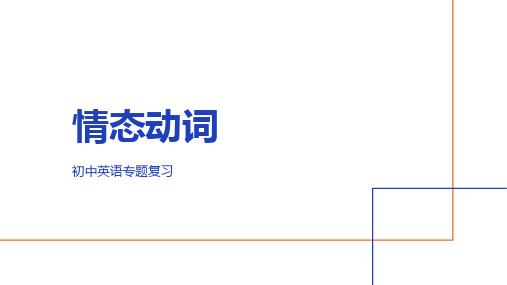
(1)只作情态动词:must;can/could;may/might;ought to
(2)既可作情态动词又可作实义动词:need,dare
((34))既 具可 有作 情情 态态 动动词词某又些可特作征稿稿定助:定hPa动PPvTP,e词T/海h:量asd素ha材tlo持l;/s续hha更odublde;twteirll/would
【知识拓展】
1. must的一般疑问句,肯定回答为Yes, ...must.;否定回答为No, ...needn’t./No, ...don’t have
to.—Must I clean the classroom now? 我必须现在打扫教室吗?
—Yes, you must. 是的,你必须。/No, you don’t have to. /No, you needn’t. 不,你不必。
He promised he would never smoke again. 他承诺他再也不吸烟了。
Their English teacher would tell them stories in
表示过去反复发生的动 English after class.
作或某种倾向
他们的英语老师总是在课后用英语给他们讲故事
新,上千款模板选择总有一
款适合你
知识点二:情态动词的特点
情态动词的特点: (1)情态动词无人称和数的变化(have to除外); (2)情态动词后接动词原形; (3)情态动词的否定式是在其后加not; have to除外 (4)具有助动词的作用,可用来构成否定句、疑问句及用于简明答语; (5)个别情态动词有现在式和稿过定去PP式T两种形式,过去式用来表达更加客气、委 婉的语气,时态性不强,可稿用定于PPT过,海去量、素材现持在续更或将来。
初中英语——情态动词
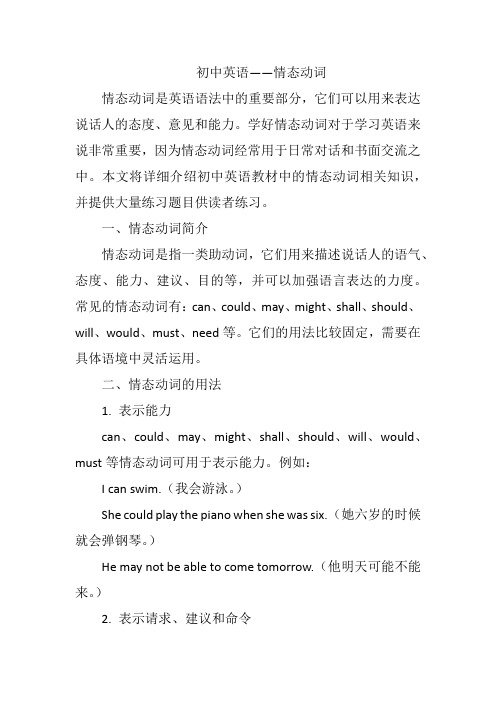
初中英语——情态动词情态动词是英语语法中的重要部分,它们可以用来表达说话人的态度、意见和能力。
学好情态动词对于学习英语来说非常重要,因为情态动词经常用于日常对话和书面交流之中。
本文将详细介绍初中英语教材中的情态动词相关知识,并提供大量练习题目供读者练习。
一、情态动词简介情态动词是指一类助动词,它们用来描述说话人的语气、态度、能力、建议、目的等,并可以加强语言表达的力度。
常见的情态动词有:can、could、may、might、shall、should、will、would、must、need等。
它们的用法比较固定,需要在具体语境中灵活运用。
二、情态动词的用法1. 表示能力can、could、may、might、shall、should、will、would、must等情态动词可用于表示能力。
例如:I can swim.(我会游泳。
)She could play the piano when she was six.(她六岁的时候就会弹钢琴。
)He may not be able to come tomorrow.(他明天可能不能来。
)2. 表示请求、建议和命令shall、should、will和would等情态动词可以用于表示请求、建议和命令。
例如:Shall we go to the cinema tonight?(我们今晚去看电影怎么样?)You should take the medicine three times a day.(你应该每天服三次药。
)Would you please open the window?(你能帮我开下窗户吗?)3. 表示可能性may、might、could和can等情态动词可以用于表示可能性。
例如:It may rain tomorrow.(明天可能会下雨。
)He could be at home.(他可能在家。
)4. 表示推测may、might等情态动词可用于表示推测。
初中英语知识点归纳情态动词的概率和态度

初中英语知识点归纳情态动词的概率和态度情态动词是英语中常用的一类动词,用来表达说话人对某种行为或情况的态度、看法、意愿、能力等态度和概率。
情态动词有很多种,包括can、could、may、might、must、shall、should、will、would等。
它们在句子中的位置一般位于行为动词之前,用来修饰行为动词或表示说话人的态度。
下面是关于情态动词的一些常见知识点的归纳。
1. 情态动词的基本用法情态动词通常用来表示说话人的态度、意愿、看法等,常见的情态动词有can、could、may、might、must、shall、should、will、would等。
它们在句子中的位置一般位于行为动词之前或句末,用来修饰行为动词或表示说话人的意愿和态度。
2. 可能性情态动词常用来表示某种行为或情况的可能性。
其中,may和might表示可能性较大,could和can表示可能性较小。
例如:- It may rain later. (可能下雨)- He could be late. (他可能会迟到)- She might come to the party. (她可能会来参加聚会)3. 推测情态动词还可以用来表示对某种情况或信息的推测。
其中,must表示说话人很肯定,should表示对某种可能性的推测,might表示某种可能性较小。
例如:- He must be busy. (他一定很忙)- She should know the answer. (她应该知道答案)- It might rain tomorrow. (明天可能会下雨)4. 动词的能力情态动词can和could还可以表示某种能力。
can表示具备某种能力,could表示过去具备某种能力或表示某种委婉的说法。
例如:- I can swim. (我会游泳)- He could speak Spanish when he was young. (他小时候会说西班牙语)5. 表示请求或邀请情态动词常用来表达请求或邀请的意思。
初中英语知识点归纳情态动词的推测和建议
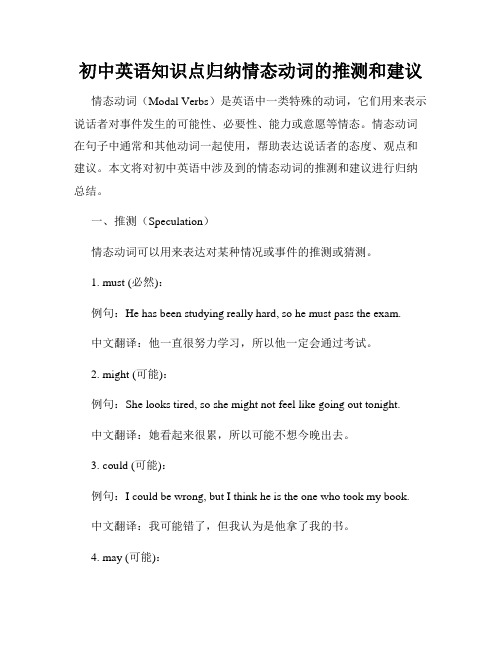
初中英语知识点归纳情态动词的推测和建议情态动词(Modal Verbs)是英语中一类特殊的动词,它们用来表示说话者对事件发生的可能性、必要性、能力或意愿等情态。
情态动词在句子中通常和其他动词一起使用,帮助表达说话者的态度、观点和建议。
本文将对初中英语中涉及到的情态动词的推测和建议进行归纳总结。
一、推测(Speculation)情态动词可以用来表达对某种情况或事件的推测或猜测。
1. must (必然):例句:He has been studying really hard, so he must pass the exam.中文翻译:他一直很努力学习,所以他一定会通过考试。
2. might (可能):例句:She looks tired, so she might not feel like going out tonight.中文翻译:她看起来很累,所以可能不想今晚出去。
3. could (可能):例句:I could be wrong, but I think he is the one who took my book.中文翻译:我可能错了,但我认为是他拿了我的书。
4. may (可能):例句:Tom may come to the party tonight, but he hasn't confirmed yet.中文翻译:汤姆可能会来参加今晚的派对,但他还没有确定。
5. can't (不可能):例句:She can't have forgotten her own birthday!中文翻译:她不可能忘记自己的生日!二、建议(Advice)情态动词还可以用来表达对他人的建议或提出自己的建议。
1. should (应该):例句:You should take a break and relax. You've been working too hard.中文翻译:你应该休息一下放松一下,你工作太辛苦了。
初中英语:情态动词

初中英语:情态动词介绍:情态动词是英语中的一个重要语法点,它们可以用来表示可能性、必要性、责任、建议等等。
在英语口语中,情态动词的使用非常频繁,但是不同的情态动词的用法又各有不同,因此,我们有必要系统地学习情态动词的用法。
本文将为大家详细介绍情态动词的用法,并提供大量的练习题和答案,帮助大家掌握情态动词的用法,让你的英语口语更加流利。
一、情态动词的概念情态动词是指表示说话人对所说内容态度、说话人主观意愿、能力、建议、命令、禁止等的动词。
常用的情态动词有can、could、may、might、must、shall、should、will、would 等九个词。
二、情态动词的用法1.表示能力、许可、建议、命令、禁止等情况1) Can / CouldCan 表示现在或未来有能力做某事;Could 表示过去或未来有能力做某事,或表示委婉语气。
如:I can swim.(我会游泳。
)Could you open the window?(你能帮忙把窗户打开吗?)2) May / MightMay 表示有可能;Might 表示有可能性的弱化。
如:It may rain tomorrow.(明天可能会下雨。
)I might go to the party.(我可能去参加聚会。
)3) MustMust 表示必须,有义务或责任做某事。
如:You must wear a seat belt in the car.(在车上必须系安全带。
)I must finish my homework tonight.(我今晚必须完成作业。
)4) Shall / ShouldShall 表示说话人的意愿,用于提出建议或征求意见;Should 表示应该做某事,并且有义务去做。
如:Shall we go to the cinema tonight?(今晚我们去看电影好吗?)You should stop smoking.(你应该戒烟。
)5) Will / WouldWill 表示意愿、意图和承诺;Would 表示委婉请求和含蓄的建议。
初中英语情态动词的讲解

初中英语情态动词的讲解情态动词是英语中的一类特殊动词,用于表示说话人的态度、推测、能力、许可等。
初中阶段研究英语时,情态动词是一个重要的语法知识点。
本文将对初中英语中常用的情态动词进行讲解。
1. CanCan 是一个情态动词,用于询问和表示能力、可能性、允许等。
是一个情态动词,用于询问和表示能力、可能性、允许等。
1.1 用法- 用于询问能力:Can 用于询问某人是否有能力做某事。
Can用于询问某人是否有能力做某事。
- Can you swim?(你会游泳吗?)- 用于表示可能性:Can 用于表示某事有可能发生。
Can用于表示某事有可能发生。
- It can rain tomorrow.(明天可能会下雨。
)- 用于征求允许:Can 用于请求允许做某事。
Can用于请求允许做某事。
- Can I borrow your pen?(我可以借用你的钢笔吗?)1.2 注意事项- 当 Can 用于疑问句时,其后的动词需用原形。
Can用于疑问句时,其后的动词需用原形。
- Can she play the guitar?(她会弹吉他吗?)2. MustMust 是一个情态动词,用于表示必须,义务和推测。
是一个情态动词,用于表示必须,义务和推测。
2.1 用法- 用于表示必须:Must 用于表示某事是必须的。
Must用于表示某事是必须的。
- You must finish your homework before watching TV.(你必须在看电视之前完成作业。
)- 用于表示义务:Must 用于表示某事是责任所在。
Must用于表示某事是责任所在。
- We must obey the rules.(我们必须遵守规则。
)- 用于表示推测:Must 用于表示一种较为确信的推测。
Must用于表示一种较为确信的推测。
- He must be tired after running for so long.(他跑了这么长时间,一定很累了。
初中英语语法大全——情态动词
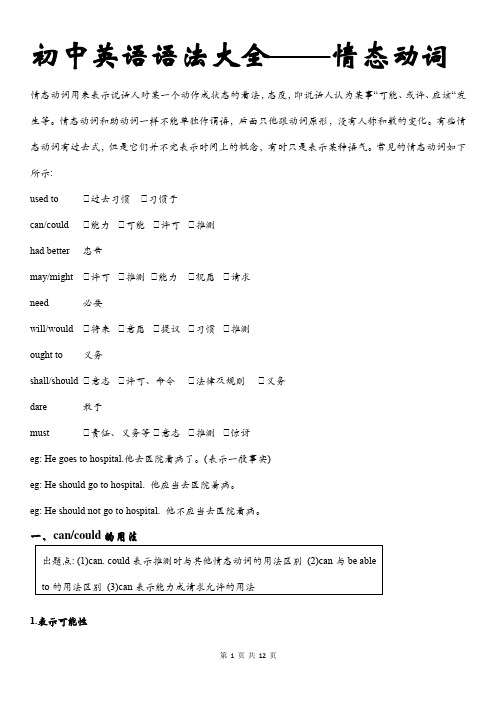
初中英语语法大全——情态动词情态动词用来表示说话人对某一个动作成状态的看法,态度,即说话人认为某事“可能、或许、应该“发生等。
情态动词和助动词一样不能单独作谓语,后面只他跟动词原形,没有人称和数的变化。
有些情态动词有过去式,但是它们并不完表示时间上的概念,有时只是表示某种语气。
常见的情态动词如下所示:used to ①过去习惯②习惯于can/could ①能力②可能③许可④推测had better 忠告may/might ①许可②推测③能力④祝愿⑤请求need 必要will/would ①将来②意愿③提议④习惯⑤推测ought to 义务shall/should ①意志②许可、命令③法律及规则④义务dare 敢于must ①责任、义务等②意志③推测④惊讶eg: He goes to hospital.他去医院看病了。
(表示一般事实)eg: He should go to hospital. 他应当去医院着病。
eg: He should not go to hospital. 他不应当去医院看病。
一、can/could的用法1.表示可能性(1) 表示说话者主观猜测的可能性时, can/could常用于否定句和疑问句中。
could 既可以表示过去的可能性,又可以表示现在的可能性,其语气更弱一些。
Who's the man over there? Is it Mr. Black? 那边那个男人是谁?是布莱克先生吗?--- It can't be him. He's much taller.不可能是他。
他更高一些。
(表示推测时用于否定句)eg: Could he still be alive after all this time? 过了这么长时间,他还可能活着吗? (表示推测时用于疑问句)(2)can用于肯定句中时表示理论上的可能性,即从理论上看有可但实际未必会发生。
有时指一时的情况,常意为“有时会”。
初中英语语法课件 几种情态动词的基本用法

EXERCISES
用适当的情态动词填空
needn’t
1. You
worry about me.
must 2. He looks so pale, he be ill.
3. Plants will die without sunshine.
3.must
表示“必须; 应该” We must finish our homework everyday.
表示“一定”
The book must belong to Jim , there is his name on the cover.
表示“硬要;偏要”
If you must go home, at least call your mom.
7. Students D tell lies. A. may not B. must C. can D. mustn`t
1. You A fail in the exam without hard working. A. will B. would C. mustn‘t D. can
2. He had to give up smoking because of his illness, C he? A. did B. does C. didn’t D. doesn‘t
2. may/might
表示请求、允许、许可, might比may的语气更委婉. 表示推测“可能”, could的可能性比can小。
—May I use the car ? —I’m afraid not. It might not be Jane. She hasn`t dicided to come here yet.
初中英语-情态动词考点总结

被动语态一起使用,给谓语动词增添情态色彩,表示说话人对有
关行为或事物的态度和看法,认为其可能、应该或必要等
一、情态动词的分类
◆情态动词的类型只作情态动词的有:must;can(could); may(might)
◆可作情态动词也可作实义动词的有:need
回答用needn’t。 eg:You needn’t come to school so early. 你不必那么早来学校。
1、表示“必须,应该”。 You must finish your homework by this Friday.
Must的用法
2、must表示推测时一般用于肯定句,意为“一定”。在否定句和疑 问句中一般用can,否定句中也可以用may,但是may not表示 “可能不”,can’t表示“不可能”。
May的用法
(1) 表示推测,意为“可能,也许”。用于肯定句中 eg: He may come tomorrow. 他明天可能回来。
can 和may 一都可以用来表示征求意见和允许,意为 “可以”。一 般可以互换使用。
(2)表示请求,允许。意为“可以”。 eg:May I borrow your book 我可以借用你的书吗?
(5)以can开头的一般疑问句,其肯定形式与否定回答分别用 can和can’t;以could开头的的一般疑问句,其肯定和 否定回答分别用could和couldn’t. Eg: ---could you skate last year? 你去年会滑冰吗? --- Yes, I could./ No, I couldn’t (肯定回答否定回答)
【题组训练】
1、He ____ work hard. 他必须努力工作。
初中英语语法-情态动词

二、表推测的用法
1. must have done过去肯定做了某事 Since the road is wet, it must have rained last night. 不存在 mustn‘t have done 的形式。其否定或疑问形式须用
can(could) 来表示. 例如: He can't have missed the way. I drew him a map. “The dictionary has disappeared. Who could have taken it?”
Did anyone dare (to) admit it?有人敢于承认吗?
He did not dare (to) leave his car there. 他不 敢把车停放在那里。
If he dares to show up at her house I’ll be surprised. 如果他敢出现在她的房子里,我会感到吃惊。
2) Should (ought to)表示推测 时,是指有一定根据的推测,意 为“可能、该”
---When can I come for the photos? I need them tomorrow,
---They ____ be ready by 12:00
3. 表示惊讶的语气
You can never imagine such a gentleman should be so rude to a lady.
1. must
2) 表示推测、可能性(只用于肯定 的陈述句) 1. You’re Tom’s good friend, so you must know what he likes best. 2 . Your mother must be waiting for you now.
情态动词初中英语
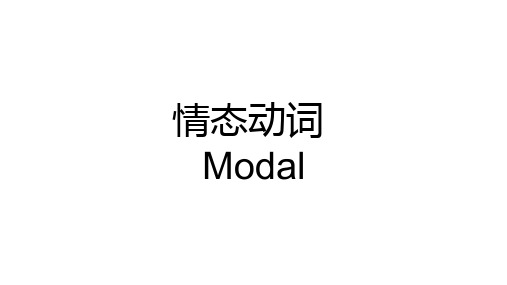
我能打台球
[kæ n] can modal 能够,可能
客观:打雷可能要下雨了
[kʊd] could modal 能够,可能
我能打台球
[kʊd] could modal 能够,可能
主观:我可能打的进去
[meɪ] may modal 可以,也许
你可以借这本书
[meɪ] may modal 可以,也许
情态动词 Modal
主语+
+ 冠词/数词+ 副词+ 形容词 + 名词
[mʌst] must modast modal 必须,一定
这些人一定犯了罪
[niːd] need modal &v.&n. 需要
老爷爷需要帮助
[kæ n] can modal 能够,可能
他也许是图书 管理员
[maɪt] might modal 可以,也许
你可以借这本书
[maɪt] might modal 可以,也许
你可以他借也这许本是书图书 管理员
[ʃæl] shall model 会
假如花缺水,我会给花浇水 当主语是I 和we 时候,过去的人用shall
[wɪl] will model 将会
假如花缺水,我会给花浇水
[wʊd] would model 将会
假如花缺水,我会给花浇水
[ʃud] should modal 应该
我应该把衣服晾在太阳下
初中英语知识点归纳情态动词和情态动词的否定形式

初中英语知识点归纳情态动词和情态动词的否定形式初中英语知识点归纳:情态动词和情态动词的否定形式情态动词(Modal Verbs)在英语语法中扮演着重要的角色。
它们通常用来表示说话人的态度、能力、推测、建议等。
其中,情态动词的否定形式也是我们需要重点了解和掌握的知识点之一。
本文将对初中英语中的情态动词及其否定形式进行归纳总结,以帮助同学们更好地学习和运用。
一、情态动词的基本概念和用法(Modal Verbs)情态动词是一类特殊的助动词,它们没有人称和数的变化形式,后面直接跟动词原形。
常见的情态动词有:can, could, may, might, will, would, shall, should, must, ought to等。
1. 表示能力和技能:- can: 能够,会- could: 过去曾能够,会例句:- I can swim.(我会游泳。
)- She could play the piano when she was six.(她六岁时就会弹钢琴。
)2. 表示许可和允许:- may: 可以,可能- might: 可以,可能(更加委婉)例句:- May I go to the restroom?(我可以去洗手间吗?)- He said that we might use his computer.(他说我们可能借用他的电脑。
)3. 表示推测和猜测:- must: 必须,一定- may/might: 可能,也许例句:- He must be tired because he worked all day.(他肯定很累,因为他整天都在工作。
)- They may/might arrive late due to the traffic.(由于交通情况,他们可能会迟到。
)4. 表示义务和建议:- should: 应该- ought to: 应该例句:- You should finish your homework before you go out.(你出去之前应该完成家庭作业。
初中英语语法大全:情态动词

初中英语语法大全:情态动词I. 情态动词基本用法:在英语中主要的情态动词有can (could), may (might), must, have to, need , ought to, dare (dared), shall (should), will (would) .1.情态动词的特征(1)情态动词本身有词义,但词义不完成,因此不能单独作谓语,只能和其他的动词原形一起构成谓语。
(2)情态动词后接的动词不定式一律不带to。
(3)情态支词不随人称变化而变(即不管是何人称,后面接的情态动词都一样)。
(4)含有情态动词的否定都是由“情态动词+not”构成的,如:can-can not may-may not need-need not (5)含有情态动词的疑问句的构成May I come in?我可以进来吗?Can you lend me some money?你能借给我一些钱吗?注意:含有have to 的句子变成疑问句时不同。
如:I have to go today,今天我必须走,Do you have to go today?你今天必须走吗?2.情态动词的用法(1)Can的用法①表示体力或脑力方面的“能力”Can you drive?你会开车吗?Can you speak English?你会说英语吗?Can you lift heavy box?你能将这个重箱子拎起来吗?②表示客观条件允许You can skate on the lake.(The ice is thick enough.)你可以在湖面上滑冰了(冰层够厚的了)The airplane can take off now.(The storm has stopped.)飞机可以起飞了(暴风雨停了)You can’t park your car here.你不能在此停车③can用在否定句和疑问句中时,有时表示说话人的怀疑,惊异、猜测或不肯定:no, no, it can’t be true.不,不,这不可能是事实How can you be so careless!你怎么会这么粗心He can’t be in the library。
初中英语情态动词详细用法归纳(含练习及答案)
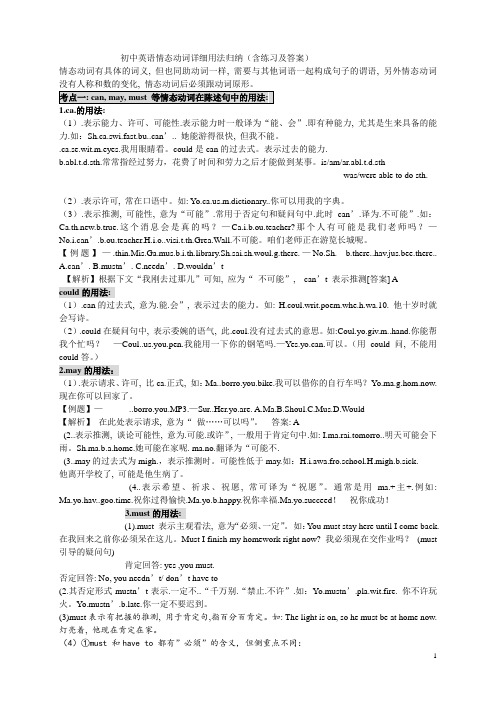
初中英语情态动词详细用法归纳(含练习及答案)情态动词有具体的词义, 但也同助动词一样, 需要与其他词语一起构成句子的谓语, 另外情态动词没有人称和数的变化, 情态动词后必须跟动词原形。
1.ca.的用法:(1).表示能力、许可、可能性.表示能力时一般译为“能、会”.即有种能力, 尤其是生来具备的能力.如:Sh.ca.swi.fast.bu..can’.. 她能游得很快, 但我不能。
.ca.se.wit.m.eyes.我用眼睛看。
could是can的过去式。
表示过去的能力.b.abl.t.d.sth.常常指经过努力,花费了时间和劳力之后才能做到某事。
is/am/ar.abl.t.d.sthwas/were able to do sth.(2).表示许可, 常在口语中。
如: .m.dictionary..你可以用我的字典。
(3).表示推测, 可能性, 意为“可能”.常用于否定句和疑问句中.此时can’.译为.不可能”.如:Ca.th.new.b.true.这个消息会是真的吗?—Ca.i.b.ou.teacher?那个人有可能是我们老师吗?—No.i.can’.b.ou.teacher.H.i.o..visi.t.th.Grea.Wall.不可能。
咱们老师正在游览长城呢。
【例题】—.thin.Mis.Ga.mus.b.i.th.library.Sh.sai.sh.woul.g.there.—No.Sh.__b.there..hav.jus.bee.there..A.can’.B.mustn’.C.needn’.D.wouldn’t【解析】根据下文“我刚去过那儿”可知, 应为“不可能”, can’t 表示推测[答案] Acould的用法:(1).can的过去式, 意为.能.会”, 表示过去的能力。
如: H.coul.writ.poem.whe.h.wa.10. 他十岁时就会写诗。
(2).could在疑问句中, 表示委婉的语气, 此.coul.没有过去式的意思。
初中情态动词的用法

初中情态动词的用法情态动词是英语语法中的一类特殊动词,它们用来表示说话人的态度、建议、推测、可能性等。
在初中英语学习中,掌握情态动词的用法对于正确表达观点和意愿非常重要。
本文将介绍情态动词的用法,并提供一些例句来帮助读者更好地理解。
1. Can情态动词“can”表示能力、许可或请求。
在表示能力时,它与动词原形连用;在表示许可或请求时,它通常与动词原形连用,但可以与“you”连用,表示提议或请求。
例句:- I can swim in the pool.(我会游泳。
)- Can I go to the restroom?(我可以去洗手间吗?)2. Could情态动词“could”表示过去的能力、许可或请求。
它的用法与“can”基本相同,但具有过去的语态。
例句:- When I was younger, I could run faster.(在我年轻的时候,我跑得更快。
)- Could you please pass me the salt?(你能给我递一下盐吗?)3. May情态动词“may”表示许可、可能性或更客气的请求。
它通常用于正式场合,表示请求或征求许可。
例句:- May I use your computer?(我可以用你的电脑吗?)- It may rain tomorrow.(明天可能会下雨。
)4. Might情态动词“might”表示过去的可能性或推测。
它与“may”类似,但用法更加含糊不确定。
例句:- He might be at home.(他可能在家。
)- I thought she might have forgotten her keys.(我以为她可能忘记带钥匙了。
)5. Must情态动词“must”表示义务、必要性或推测的确定性。
它通常用于强调推测、肯定或提醒。
例句:- You must finish your homework before you go out.(你必须在出去之前完成作业。
初中英语知识点归纳情态动词的可能性和愿望
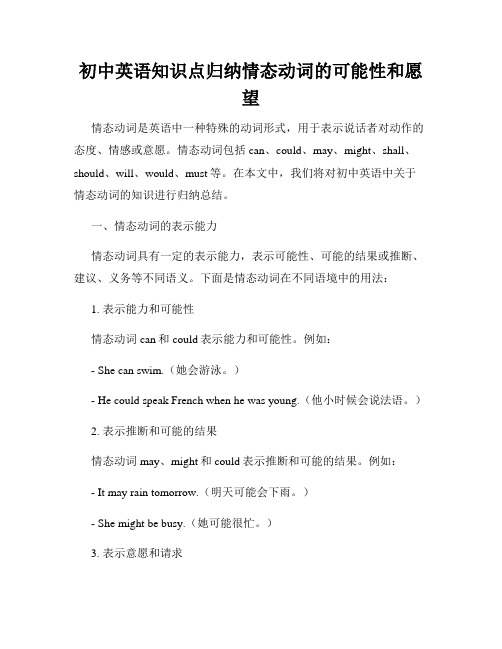
初中英语知识点归纳情态动词的可能性和愿望情态动词是英语中一种特殊的动词形式,用于表示说话者对动作的态度、情感或意愿。
情态动词包括can、could、may、might、shall、should、will、would、must等。
在本文中,我们将对初中英语中关于情态动词的知识进行归纳总结。
一、情态动词的表示能力情态动词具有一定的表示能力,表示可能性、可能的结果或推断、建议、义务等不同语义。
下面是情态动词在不同语境中的用法:1. 表示能力和可能性情态动词can和could表示能力和可能性。
例如:- She can swim.(她会游泳。
)- He could speak French when he was young.(他小时候会说法语。
)2. 表示推断和可能的结果情态动词may、might和could表示推断和可能的结果。
例如:- It may rain tomorrow.(明天可能会下雨。
)- She might be busy.(她可能很忙。
)3. 表示意愿和请求情态动词will、would和shall用于表示意愿和请求。
例如:- Will you help me with my homework?(你愿意帮我做作业吗?)- Would you like a cup of tea?(你想要一杯茶吗?)4. 表示建议和命令情态动词should和ought to用于表示建议和命令。
例如:- You should study hard for the exam.(你应该努力学习准备考试。
)- You ought to apologize to her.(你应该向她道歉。
)5. 表示必要性和义务情态动词must表示必要性和义务。
例如:- We must follow the rules.(我们必须遵守规则。
)- You must finish your homework before going out.(你必须在外出之前完成作业。
初中资料英语情态动词有哪些
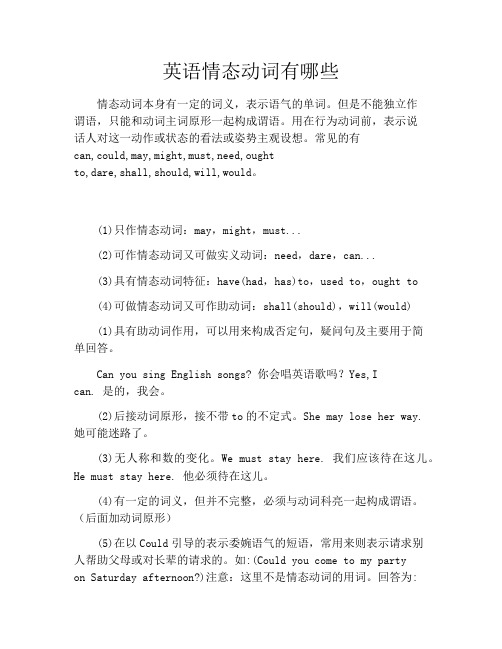
英语情态动词有哪些情态动词本身有一定的词义,表示语气的单词。
但是不能独立作谓语,只能和动词主词原形一起构成谓语。
用在行为动词前,表示说话人对这一动作或状态的看法或姿势主观设想。
常见的有can,could,may,might,must,need,oughtto,dare,shall,should,will,would。
(1)只作情态动词:may,might,must...(2)可作情态动词又可做实义动词:need,dare,can...(3)具有情态动词特征:have(had,has)to,used to,ought to(4)可做情态动词又可作助动词:shall(should),will(would)(1)具有助动词作用,可以用来构成否定句,疑问句及主要用于简单回答。
Can you sing English songs? 你会唱英语歌吗?Yes,Ican. 是的,我会。
(2)后接动词原形,接不带to的不定式。
She may lose her way. 她可能迷路了。
(3)无人称和数的变化。
We must stay here. 我们应该待在这儿。
He must stay here. 他必须待在这儿。
(4)有一定的词义,但并不完整,必须与动词科亮一起构成谓语。
(后面加动词原形)(5)在以Could引导的表示委婉语气的短语,常用来则表示请求别人帮助父母或对长辈的请求的。
如:(Could you come to my partyon Saturday afternoon?)注意:这里不是情态动词的用词。
回答为:肯定:Yes,I can./Sure./Certainly.否定:Sorry,I am afraid not.(在作否定回答时,要注意:在拒绝男方的请求时,不能用can not,这样显得言语太过生硬,不礼貌。
但是在长辈拒绝晚辈的请求是可以用can not的。
)。
初中英语语法:情态动词讲解及练习
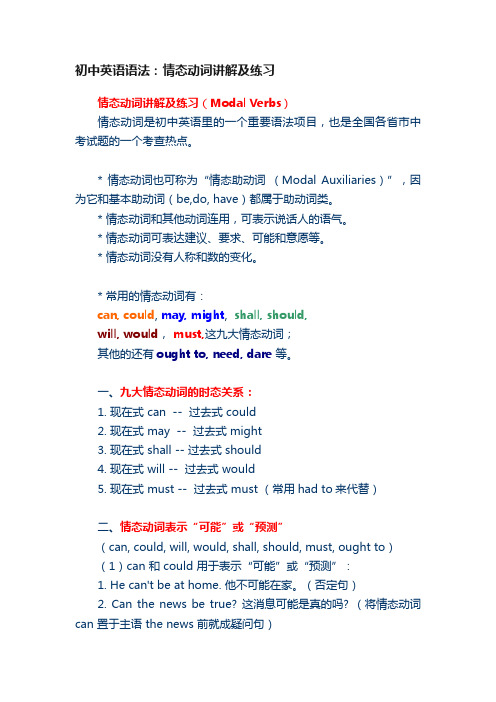
初中英语语法:情态动词讲解及练习情态动词讲解及练习(Modal Verbs)情态动词是初中英语里的一个重要语法项目,也是全国各省市中考试题的一个考查热点。
* 情态动词也可称为“情态助动词(Modal Auxiliaries)”,因为它和基本助动词(be,do, have)都属于助动词类。
* 情态动词和其他动词连用,可表示说话人的语气。
* 情态动词可表达建议、要求、可能和意愿等。
* 情态动词没有人称和数的变化。
* 常用的情态动词有:can, could, may, might, shall, should,will, would,must,这九大情态动词;其他的还有ought to, need, dare等。
一、九大情态动词的时态关系:1. 现在式 can -- 过去式 could2. 现在式 may -- 过去式 might3. 现在式 shall -- 过去式 should4. 现在式 will -- 过去式 would5. 现在式 must -- 过去式 must (常用had to来代替)二、情态动词表示“可能”或“预测”(can, could, will, would, shall, should, must, ought to)(1)can 和 could 用于表示“可能”或“预测”:1. He can't be at home. 他不可能在家。
(否定句)2. Can the news be true? 这消息可能是真的吗? (将情态动词can 置于主语 the news 前就成疑问句)3. Anybody can make mistake. 任何人都可能犯错误。
(只表示理论上的可能性)(2)may 和 might 用于表示“事实上的可能性”或“预测”:1. It may rain tomorrow. (表示可能会发生)明天可能会下雨。
2. It may snow later this afternoon. (表示预测)今天下午可能会下雪。
初中英语十大情态动词用法

初中英语十大情态动词用法十大情态动词1. can⑴表示能力,一样译为“能、会”,专门指生来具备的能力。
She can swim fast, but I can’t . 她会游泳,但我可不能。
⑵表示许可,常在口语中。
You can use my dictionary. 你能够使用我的词典。
⑶表示估量,意为“可能”,常用于否定句和疑问句中,现在can’t 译为“不可能”。
Can the news be true? 那个消息可能是确实吗?It can’t be our teacher. He is on a visit to the Great Wall.不可能是老师。
他正在参观长城呢。
2. could⑴can的过去式,意为“能、会”,表示过去的能力。
He could write poems when he was 10. 他十岁的时候就会写诗。
⑵could在疑问句中,表示委婉要求的语气,现在could没有过去式的意思。
Could you do me a favor? 你能够帮我一个忙吗?—Could I use your pen? 我能够使用你的钢笔吗?—Yes, you can.(注意回答)能够。
3. may⑴表示要求、许可,比can正式,May I borrow your bike? 我能够借用你的自行车吗?You may go home now. 你现在能够回家了。
⑵表示估量,谈论可能性,意为“可能,或许”,一样用于确信句中。
It may rain tomorrow . 改日可能会下雨。
⑶may的过去式为might。
might 也表示可能性低于may(现在migh t没有过去式的意思)。
He is away from school. He might be sick. 他离开学校了。
也许是病了。
⑷表示期望、祈求、祝愿,常可译为“祝愿”。
通常是用may +主+VMay you have a good time!祝你玩的愉快!May you be happy! 祝你欢乐!4. must⑴must 表示主观看法,意为“必须”。
- 1、下载文档前请自行甄别文档内容的完整性,平台不提供额外的编辑、内容补充、找答案等附加服务。
- 2、"仅部分预览"的文档,不可在线预览部分如存在完整性等问题,可反馈申请退款(可完整预览的文档不适用该条件!)。
- 3、如文档侵犯您的权益,请联系客服反馈,我们会尽快为您处理(人工客服工作时间:9:00-18:30)。
以must为例。
must + do(be)是推测现在存在的一般状态进行;must + be doing 推测可能正在进行的事情;must +have done是推测可能已经发生过的事情。
1. must“肯定,一定”语气强,只用于肯定句中。
He must be a man from America. / He must be talking with his friend. / He must have already arrived there.
2. may和might“也许”,后者语气弱,更没有把握。
可用于肯定句和否定句。
He may not be at home. / They might have finished their task.
3. can和could“可能”,could表示可疑的可能性,不及can’t语气强,用于肯定、否定、疑问句中。
The weather in that city could be cold now.
We could have walked there; it was so near.(推测某事本来可能发生,但实际上没有发生)
Can he be in the office now? No, he can’t be there, for I saw him in the library just now.(语气很强,常用于疑问句和否定句中)
III. 情态动词注意点:
1. can和be able to 都可以表示能力。
但be able to可以表达“某事终于成功”,而can无法表达此意。
Be able to有更多的时态。
另外,两者不能重叠使用。
2. used to和would: used to表示过去常常做现在已经不再有的习惯,而would只表示过去的习惯或喜好,不涉及现在。
3. need和dare作情态动词和实义动词的区别:
两者作情态动词时常用于否定句和疑问句。
其形式为:needn’t/daren’t do;Need/dare…do…?
做实义动词时可用于肯定句,否定句和疑问句。
其形式为:need(needs/needed)/dare(dares/dared) to d o,
don’t(doesn’t/didn’t) need/dare to do。
